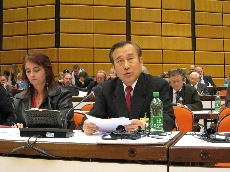
Dr. Tadatoshi Akiba, Mayor of Hiroshima, Japan, President of Mayors for Peace
Thank you Mr. Chairman,
On August 23, 1945, just two weeks after the atomic bombing of Nagasaki, a woman gave birth to a baby boy. She and the boy were among the lucky ones. Of the thousands of pregnant women in Nagasaki at that time, many were killed outright, or many of their babies were stillborn or severely deformed. This lucky child grew up to become the Mayor of Nagasaki and a forceful campaigner against nuclear weapons. He knew well many less fortunate than him, so he knew whereof he spoke!
Sixteen days ago, while running for a fourth term, this Mayor, my friend Iccho Itoh, was shot in the back by a yakuza gangster. Mayor Itoh loathed nuclear weapons so intensely that one of his dying thoughts might well have been regret over being robbed of the chance of living to see them eliminated. It pains me to think of it.
Mr. Chairman,
Last month we also lost our good friend and civil society leader, Janet Bloomfield. It is time for us all to contemplate how we can contribute to finishing the noble task to which they were so dedicated.
Mayors for Peace has set forth the vision of a world free from nuclear weapons by the year 2020. That is only thirteen years away now; God willing, most of us gathered here will be alive in 2020. How old will you be in 2020? How old will your children or grandchildren be in 2020? Will we be able to remove the nuclear cancer from our planet before it destroys us all? Can we give our planet the precious gift of health by 2020?
The prognosis is not encouraging. The unanimous finding of the International Court of Justice that all states are under an obligation to negotiate in good faith and bring to a conclusion measures leading to nuclear disarmament in all its aspects has been mocked by ten years of inaction in the Conference on Disarmament!
Three weeks ago I wrote to the Heads of Governments of all the members of the Conference on Disarmament. I challenged them to seize the opportunity created by this year�fs Presidents of the CD. As you know, they have proposed a formula for going forward on several fronts simultaneously, including one on nuclear disarmament. But the diplomats in Geneva have taken this as far as they humanly can. This moment requires leadership that only heads of government can provide.
Delegates of CD members,
It has been ten years since the International Court of Justice (ICJ) issued its advisory opinion that “The threat or use of nuclear weapons would generally be contrary to the rules of international law….” In the same opinion, the judges found unanimously that “There exists an obligation to pursue in good faith and bring to a conclusion negotiations leading to nuclear disarmament in all its aspects under strict and effective international control.” To highlight this opinion, Mayors for Peace has issued a Good Faith Challenge that challenges elected officials and citizens at all levels to press aggressively for the immediate start of good-faith negotiations toward nuclear disarmament. As a conference of cities, Mayors for Peace is setting an example through our Cities Are Not Targets project. We are calling on all cities to publicly demand from the nuclear-weapon states assurances that their city is not and will not be targeted for nuclear attack. In fact, we are asserting that such an attack on any city or any place where people live is absolutely illegal and immoral.
Until every leader of a country that already supports the P6 proposal has spoken to every leader of a country that does not yet support the P6 proposal, no one should rest. Please do not tell me that your country is already doing what it can. Tell me what more your leader is planning to do in the next two weeks. Ten years of inaction can only be solved by ten days of hyperactivity!
If the Conference on Disarmament is still deadlocked at the end of this coming summer, the NGO community worldwide will be calling for a UNGA sub-committee on nuclear disarmament. That approach was set aside to give the six presidents of the 2006 CD sessions a chance to forge a new way forward in the CD. In 2007, we are witnessing the culmination of that process. This is, indeed, a moment of reckoning.
Let us be candid: the P6 proposal is only a baby step in the right direction. Only fissile material will be subject to negotiations. According to the 1995 NPT extension decision package, these talks are twelve years overdue. Even then, most of the nuclear-armed states insist that only production of new material should be dealt with. That is easy for them to say, as they sit on mountains of excess weapons-grade materials. A Fissile Materials Cut-Off Treaty will not impede their weapon procurement plans one iota.
All the nuclear-weapon states have nuclear-weapon acquisition programs meant to perpetuate their nuclear forces into the second half of this century. The most positive thing these states could do is to declare a multilateral moratorium on their nuclear weapons acquisition programs. Our friends, the students of the International Law Campaign, who are also among the youngest participants in this conference, point out quite rightly that, “Instead of each country childishly justifying its unilateral acquisition program because ‘everybody-else-is-doing-it’, all of them should take a ‘time out’.”
Five years of no nuclear weapon acquisition activity combined with nuclear disarmament talks beginning and evolving in Geneva would get us to the point where acquisition plans will have become irrelevant. Think of the money saved, the talent directed to urgent needs, the goodwill generated, and how much closer we could be to the Millennium Development Goals.
So, who among the nuclear-weapon states is ready to get this positive momentum going? This PrepCom would be the perfect place to step forward!
At the insistence of a few nuclear-weapon states, the P6 proposal calls only for substantive discussion, not negotiations on nuclear disarmament. I say let the substantive discussion begin, but it must quickly evolve into negotiations on a framework agreement that identifies all the measures that will be needed to achieve and maintain a nuclear-weapon-free world. Furthermore, it must specify when each measure is to become operative.
The thirteen practical steps of 2000 could serve as the starting point for such talks; the model nuclear weapons convention is another most valuable resource. Such an over-arching framework will give all parties confidence that their security concerns will have been addressed by the time the world is nuclear-weapon free. Even FMCT talks would benefit from being placed this larger context.
Mayor Itoh often said: Nuclear weapons and humanity cannot co-exist indefinitely. Mayors for Peace underscores this point by declaring that Cities Are Not Targets. Half of humanity lives in cities today; the only targets commensurate with the destructive power of nuclear weapons are cities. The mutual destruction of cities underpins the concept of deterrence. But I have yet to meet a city mayor who was consulted on this matter! The 1600 plus cities in Mayors for Peace unequivocally reject our role as hostages to this MADness. And we believe that we speak on behalf of all cities ? on behalf of half of humanity ? when we say this.
The US Conference of Mayors wrote to the Russian, Chinese, and US Governments about ending this mutual hostage taking. In my capacity as President of Mayors for Peace, I have written to the leaders of all nine nuclear-armed states demanding that they acknowledge the illegality of attacking cities or exposing cities to radioactive fallout. With the honorable exception of the United Kingdom the response has been�csilence. As if we, the hostages, have no right or standing whatsoever to challenge their illegal threats! And even the response of the UK was evasive.
I ask the heads of delegation of the five nuclear-weapon states to consider whether it would be appropriate for them to answer this question: Have you ruled out the use of nuclear weapons in lethal proximity to cities? I am sure that anytime over the next eight days this gathering would listen with great interest to any answer you may provide. I would remind you that the ICJ underscored that even the threat of such a use is a crime against humanity.
Mr. Chairman, honorable delegates,
This afternoon, your proceeding will return to the regular exchange of views among diplomats. Please do not forget Ms. Bloomfield and Mayor Itoh; please do not forget our children and their children. Keep your eyes on the prize: a nuclear-weapon-free world!
